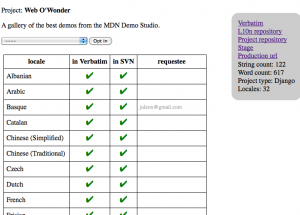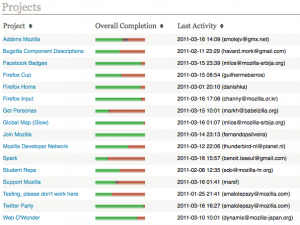March of 2011 is special for all of us. It’s the Firefox 4 release month and the whole project is operating in it’s “crazy” mode.
One particular plane on which it’s pretty visible is localization as we’re involved in almost every aspect of the release, every little detail, every step of the product release, every engagement campaign and of course in every bit of discussion about the state of the web that happens in our respective countries.
The story
 As an organization that has glocalisation imprinted on the very fabric of its universe, we always feel responsible for making sure that everything we do is localizable, so that our communities around the world can translate and adjust everything that Mozilla project creates and use it to promote the Mozilla mission in their regions.
As an organization that has glocalisation imprinted on the very fabric of its universe, we always feel responsible for making sure that everything we do is localizable, so that our communities around the world can translate and adjust everything that Mozilla project creates and use it to promote the Mozilla mission in their regions.
That’s easy to say, much harder to do. Especially as we grow, and the number of projects that we touch goes up. Firefox 4 release brings an unprecedented number of web projects that are part of our push to make bring the web to the next level.
Those projects vary from HTML5 demo sites, through Mozilla Developer Network Demo Studio, social web projects for twitter and facebook, web games to new Mozilla Foundation campaign – Join Mozilla. In total, I believe, we’re preparing 12 separate projects that we call “special projects” that are going to more or less closely accompany Fx4 release (not to mention Firefox 4 l10n itself, and our major projects like SUMO, MDN, AMO).
Each of the projects is very different and unique, uses different set of technologies and is embedded into different environment and yet we need to unify it for our localization community so that they don’t have to learn how to localize each of them separately.
Given the usual amount of challenges multiplied by 12 different setups it could have been a mess and it should have been impossible, but thanks to a great work done mostly by Staś Małolepszy, our team of l10n-drivers unified the experience as much as possible and localizers are right now doing an amazing job by bringing those special projects to every corner of the Earth, to billions of people.
Below is a summary of what happens there.
Pre-process
 First, Staś or me, we’re talking to the team that is working on the project, and we make sure that the UI of the project will be localizable and the technology makes localization possible. Then we work side by side with the developers of the project to make sure that what they code is internationalized basing on the excellent documentation of such process prepared by Staś.
First, Staś or me, we’re talking to the team that is working on the project, and we make sure that the UI of the project will be localizable and the technology makes localization possible. Then we work side by side with the developers of the project to make sure that what they code is internationalized basing on the excellent documentation of such process prepared by Staś.
Once the code is done, we’re analyzing if everything is localizable, and if the design is flexible enough to allow different forms of text to fit (longer strings or right-to-left). We also lobby for the “string freeze” to happen early enough to give localizers enough time before the release. At the same time we work with our webdev and IT teams to ensure that we will have stage servers that localizers can use to test their work and infrastructure in place to bring the latest translations live on the stage.
Finally, when we have the code, we’re string-frozen, we have the strings exported and the stage ready to be used, we post a message on the mozilla.dev.l10n.web newsgroup to announce the localization phase.
Localization
 And that’s when the magic happens. From the moment of the announcement, we’re collecting “opt-ins” from our local communities interested in the given project. We even have a special app for that – “webby”. When they opt-in, we add their locale to Verbatim and we just sit there and wait with our jaws on the floor as the red bars turn into green, project by project, locale by locale.
And that’s when the magic happens. From the moment of the announcement, we’re collecting “opt-ins” from our local communities interested in the given project. We even have a special app for that – “webby”. When they opt-in, we add their locale to Verbatim and we just sit there and wait with our jaws on the floor as the red bars turn into green, project by project, locale by locale.
It’s amazing and humbling to see how much energy and excitement is being generated around those projects. How people want to be part of the process of making those projects possible, and how eager they are to spread the messages across the world.
As I write those words, there are seven projects alive, localized into tens of locales and each day we see more requests for opt ins. Today, we’re adding the next three projects and I already know that the same will happen. It’s pure magic that may happen only in places like Mozilla, and with a community like the one we built here.
Over the next weeks we’ll bring those funny, exciting, challenging and important projects to many places on Earth, and together with the Firefox 4 release in 73 languages, we will bring the web to the next level.
We’re not done yet, but I wanted to share my excitement and respect to what our localization community is doing right now as they juggle those nearly 20 localization project balls in the air with such a grace.
Kudos to you, friends! You’re the rockstars of the Web and I’m honored to work with you. 🙂
2 replies on “Crazy times for the localizers”
Congratulations to the localizers… Amazing feats!
From the localizer side, thanks for your efforts and rapid movements for making all a bit easier!